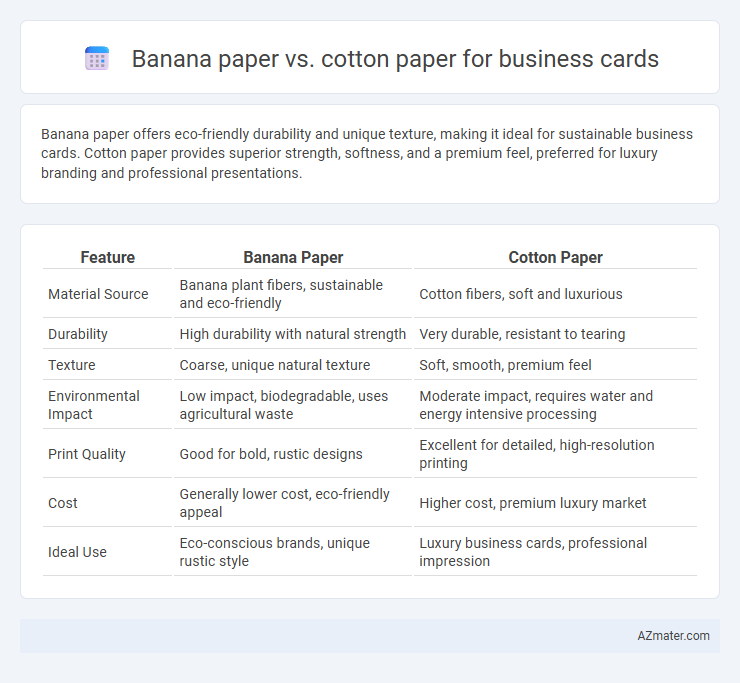Banana paper offers eco-friendly durability and unique texture, making it ideal for sustainable business cards. Cotton paper provides superior strength, softness, and a premium feel, preferred for luxury branding and professional presentations.
Table of Comparison
| Feature | Banana Paper | Cotton Paper |
|---|---|---|
| Material Source | Banana plant fibers, sustainable and eco-friendly | Cotton fibers, soft and luxurious |
| Durability | High durability with natural strength | Very durable, resistant to tearing |
| Texture | Coarse, unique natural texture | Soft, smooth, premium feel |
| Environmental Impact | Low impact, biodegradable, uses agricultural waste | Moderate impact, requires water and energy intensive processing |
| Print Quality | Good for bold, rustic designs | Excellent for detailed, high-resolution printing |
| Cost | Generally lower cost, eco-friendly appeal | Higher cost, premium luxury market |
| Ideal Use | Eco-conscious brands, unique rustic style | Luxury business cards, professional impression |
Introduction: The Evolution of Business Card Materials
Banana paper and cotton paper represent innovative trends in sustainable business card materials, each offering unique textures and environmental benefits. Banana paper, made from banana fibers, provides a durable and eco-friendly alternative that supports waste reduction and agricultural byproduct utilization. Cotton paper, composed of high-quality cotton linters, delivers a luxurious feel with excellent durability and archival properties, favored for its classic and professional appearance.
Banana Paper vs Cotton Paper: An Overview
Banana paper, made from banana plant fibers, offers an eco-friendly alternative to traditional cotton paper, boasting sustainability and biodegradability. Cotton paper provides a premium, durable texture with excellent print quality but involves higher environmental costs due to water and chemical use in production. Choosing between banana paper and cotton paper for business cards depends on prioritizing eco-conscious materials versus luxury feel and longevity.
Environmental Impact: Sustainability Compared
Banana paper, made from agricultural waste fibers, offers a more sustainable alternative to traditional cotton paper by reducing reliance on water-intensive crops and minimizing deforestation. It requires lower energy consumption and generates less carbon emissions throughout production, contributing to a smaller environmental footprint. Cotton paper, while durable and high-quality, often involves extensive water use and pesticide application, making banana paper a greener choice for eco-conscious business cards.
Texture and Aesthetic Differences
Banana paper offers a unique, fibrous texture with a natural, rustic aesthetic that enhances eco-friendly branding, while cotton paper provides a smooth, luxurious feel with consistent grain ideal for high-end, professional business cards. The tactile experience of banana paper reflects sustainability through its slightly coarse surface, whereas cotton paper's soft finish conveys elegance and durability. Choosing between the two depends on the desired brand narrative--organic authenticity versus refined sophistication.
Durability and Longevity of Each Material
Banana paper offers exceptional durability due to its strong natural fibers derived from banana plant waste, making it resistant to tearing and environmental wear, ideal for eco-conscious business cards meant to last. Cotton paper, composed of high-quality cotton fibers, provides superior longevity with excellent resistance to yellowing, moisture, and general degradation, ensuring business cards maintain their premium feel and appearance over time. Both materials surpass standard wood pulp paper in durability, but cotton paper edges out in longevity and timeless quality, while banana paper stands out for its sustainable strength.
Printing Quality and Color Vibrancy
Banana paper offers a unique texture that enhances printing quality through its fibrous surface, producing sharp and detailed images ideal for rustic or eco-friendly business card designs. Cotton paper, renowned for its smooth finish and high durability, ensures exceptional color vibrancy and sharpness, making it a preferred choice for premium business cards demanding vivid and consistent hues. Comparing the two, cotton paper generally surpasses banana paper in achieving richer color saturation and finer detail, while banana paper provides an organic aesthetic that can complement brand identity focused on sustainability.
Cost Analysis: Which Is More Economical?
Banana paper generally costs less to produce than cotton paper due to the abundant availability of banana fibers and lower processing expenses, making it a budget-friendly choice for business cards. Cotton paper, known for its durability and premium feel, typically commands higher prices linked to the energy-intensive processing of cotton fibers and supply chain complexities. When considering large volumes, banana paper offers significant cost savings without sacrificing eco-friendliness, whereas cotton paper suits businesses prioritizing luxury branding but requiring a higher investment.
Brand Image and Eco-Friendly Appeal
Banana paper business cards enhance brand image by showcasing commitment to sustainability through innovative use of agricultural waste, appealing to eco-conscious consumers. Cotton paper, known for its luxurious texture and durability, conveys a premium, high-quality brand perception while supporting eco-friendly initiatives due to its biodegradable nature. Both materials strengthen eco-friendly appeal, but banana paper offers a unique storytelling element that differentiates brands in competitive markets.
Availability and Customization Options
Banana paper offers unique sustainability appeal but has limited availability compared to widely accessible cotton paper, which is more commonly stocked by suppliers. Cotton paper provides extensive customization options including texture, thickness, and printing finishes, whereas banana paper's customization is often restricted due to its niche production process. Businesses prioritizing eco-friendly branding may opt for banana paper despite fewer customization choices, while those seeking varied design flexibility typically prefer cotton paper.
Choosing the Right Paper for Your Business Card
Choosing the right paper for your business card depends on durability, texture, and environmental impact. Banana paper offers a sustainable alternative with a unique fibrous texture, made from banana plant waste, providing eco-friendly branding that appeals to conscious consumers. Cotton paper delivers a luxurious, soft feel with high durability and a classic appearance, enhancing the perception of professionalism and quality for premium business cards.

Infographic: Banana paper vs Cotton paper for Business card
 azmater.com
azmater.com